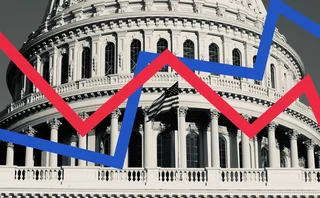
Derivatives Dealers Must Co-Operate And Automate, Concludes Isda Survey
LONDON--Automation of back-office processes and standardisation of settlement terms are issues that over-the-counter derivatives dealers must address if they want to improve the efficiency of their businesses. That is the conclusion made by Isda's first operations processing benchmarking survey.
In the 2000 Operations Benchmarking Survey, published in October, the International Swaps and
Only users who have a paid subscription or are part of a corporate subscription are able to print or copy content.
To access these options, along with all other subscription benefits, please contact info@risk.net or view our subscription options here: http://subscriptions.risk.net/subscribe
You are currently unable to print this content. Please contact info@risk.net to find out more.
You are currently unable to copy this content. Please contact info@risk.net to find out more.
Copyright Infopro Digital Limited. All rights reserved.
As outlined in our terms and conditions, https://www.infopro-digital.com/terms-and-conditions/subscriptions/ (point 2.4), printing is limited to a single copy.
If you would like to purchase additional rights please email info@risk.net
Copyright Infopro Digital Limited. All rights reserved.
You may share this content using our article tools. As outlined in our terms and conditions, https://www.infopro-digital.com/terms-and-conditions/subscriptions/ (clause 2.4), an Authorised User may only make one copy of the materials for their own personal use. You must also comply with the restrictions in clause 2.5.
If you would like to purchase additional rights please email info@risk.net
More on Markets
How US shutdown set off long-awaited basis bet
Hedge funds dust off a years-in-the-making relative value trade to profit from fallback mismatch
ECB seeks capital clarity on Spire repacks
Dealers split between counterparty credit risk and market risk frameworks for repack RWAs
FXSpotStream expands into US Treasuries trading
Bank-owned streaming venue targets mid-year launch, offering “all you can eat” subscription fees
Crisis-era CDO protection keeps on giving for Athene
Apollo-owned insurer still sees payments from sold CDS protection on a 2006 synthetic resecuritisation
The changing shape of variation margin collateral
Financial firms are open to using a wider variety of collateral when posting VM on uncleared derivatives, but concerns are slowing efforts to use more non-cash alternatives
Will lifer exodus kill Taiwan’s NDF market?
Traders split over whether insurers’ retreat from FX hedging is help or hindrance
How Australia’s inflation overhaul could lure global traders
Australia’s move to monthly inflation reporting set to revitalise local inflation-linked bond and swap markets
Calamos brings popular US autocall ETF to Europe
Dublin filing points to Q1 launch for Calamos Autocallable Income Ucits ETF







